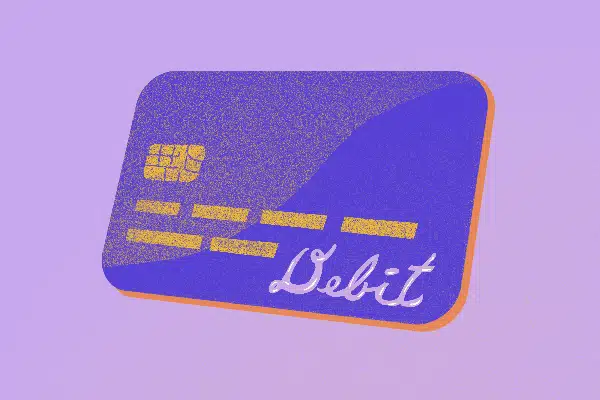'Will That Be Debit or Credit?' The Answer Is Trickier Than You Think

Welcome to Dollar Scholar, a personal finance newsletter written by a 27-year-old who’s still figuring it out: me.
Every week, I talk to experts about a money question I have, whether that’s “What if I don't have a 401(k)? or “How many credit cards do I need?” As I learn, I share simple ways to improve your financial life… and post cute dog photos.
This is (part of) the 27th issue. Check it out below, then subscribe to get future editions of Dollar Scholar every Wednesday.
When I look back on my teenage years, I can identify several turning points in my life.
A perfect example is the day I made a MySpace page. It’s laughable now, but it was a big deal to 15-year-old Julia. Being able to blast bulletins and tinker with my top 8 felt like a huge development at the time.
And then there was the day I got my debit card. My mom and grandma took me to the bank next to Chili’s in my hometown, and together we set up my first checking account. As I filled out the paperwork, I felt my world change, just like it had with MySpace. I was free! I could buy whatever I wanted, whenever I wanted!
So imagine my surprise when I learned a couple of months ago that there are people who never even use their debit cards. My editor is one of them — he puts nearly all of his purchases on a credit card in order to rack up rewards points.
This has made me reconsider everything. Should I ditch my debit card?
Credit expert John Ulzheimer, formerly of FICO and Equifax, didn’t even have to think before answering my question. “Converting from debit to credit is a very good idea,” he says.
Despite my initial enthusiasm for debit, Ulzheimer pointed out that credit has the advantage over debit in a couple of areas. Perhaps the biggest is fraud protection. This is going to get confusing, so read the next two paragraphs carefully.
If my DEBIT card is stolen/used without permission, it falls under the Electronic Fund Transfer Act. If I tell my bank before any charges are made, I won’t lose anything. If I tell them within two business days, the most I can lose is $50. If I tell them after the two-day mark but within 60 days of getting my statement, my maximum liability is $500. If I tell my bank after that 60-day point, there’s no limit to how much I can lose. 😱
But if my CREDIT card is stolen/used without permission, it falls under the Fair Credit Billing Act. If I tell the company before any charges are made, I’m not liable for anything. If I tell them afterward, the most I can lose is $50, and it probably won’t even be that. That’s because the four major card companies — American Express, Mastercard, Visa and Discover — all have $0 fraud liability policies.
In addition to this legal mumbo jumbo, Ulzheimer told me there’s simply a big difference in the sense of urgency in both cases.
“With debit cards, that’s your money that was stolen,” he says. “With credit cards, that was the bank’s money that was stolen.”
Credit cards are also great for — duh — building credit, whereas a debit card doesn’t influence my score at all. And don’t even get me started on points.
My inclination to use debit over credit isn’t unique. A 2018 survey from payment services firm TSYS found that 54% of respondents prefer to pay with debit cards, while only 26% like to use their credit cards.
To be fair, debit cards can be better for some people, according to Cyndie Martini, the president and CEO of Member Access Processing. They limit how much I can spend by design. If I know that I have trouble paying off my credit card balance every month, I might want to opt for debit as an exercise in self-discipline.
“It boils down to, do you have sound financial management principles in order to be able to do this comfortably?” Martini says. “You have to be very honest with yourself [about] what your lifestyle is, what your budget is, what your income allows you to do. Make sure that you are realistic about what you’re spending on a monthly basis.”
Bottom line: I should chill on my debit card usage and start putting down my credit card more often. But I should take a hard look in the mirror every once in a while so I don’t overspend or miss payments.
“If you’re disciplined, it’s not really even a close call between the two,” Ulzheimer adds. “The credit card wins, hands down.”
More on Money:
The New Rules for Figuring Out How Much Home You Really Can Afford
